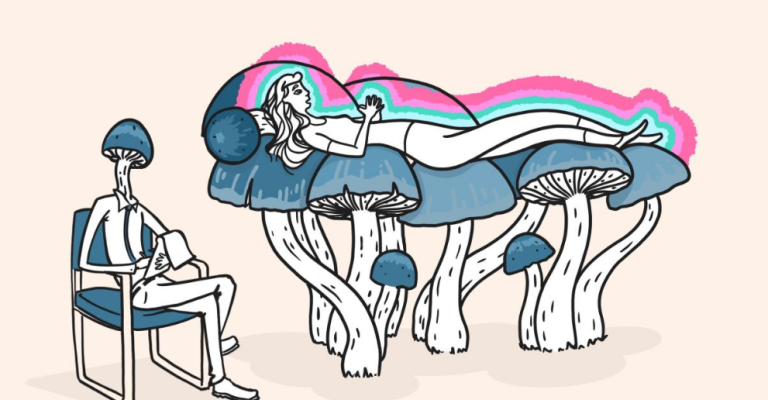psilocybin
How psilocybin, the psychedelic in mushrooms, may rewire the brain to ease depression, anxiety and more ?
Exploring Emerging Studies on psychedelics and their Potential to Treat Depression and Anxiety
Introduction
In recent years, there has been an increased interest in the potential of psychedelics to treat depression and anxiety. Psilocybin, a naturally occurring compound found in certain types of mushrooms, is one such psychedelic that has shown promise for treating mental health issues. In clinical trials involving psilocybin-assisted therapy, participants have reported reduced levels of depression and anxiety as well as improved symptoms associated with post-traumatic stress disorder (PTSD), obsessive compulsive disorder (OCD) and drug addiction. While more research is needed to fully understand the effects of psilocybin-assisted therapy, it is important to note that this form of treatment does come with risks—such as hallucinations or flashbacks—that can cause discomfort or distress for some users.
How Psilocybin Works on the Brain
The effects of psilocybin on the brain are complex and still not fully understood. However, it is thought that when consumed, psilocybin alters the neurotransmitter serotonin in the brain, which can lead to changes in behavior and perception. Additionally, research suggests that this compound may affect neural pathways by stimulating certain areas of the brain associated with creativity and introspection. This could explain why some people report feelings of connectedness or increased insight after consuming psilocybin-containing mushrooms. Furthermore, studies suggest that this psychedelic has an impact on cognitive functions such as memory formation and recall; however more research is needed to further understand these effects. Overall, while there is still much to be learned about how exactly psilocybin works on the brain, its potential for treating a variety of mental health conditions should not be underestimated.
Psilocybin’s Effect on Mental Health
In addition to its potential for reducing anxiety and depression, psilocybin may also help to alleviate post-traumatic stress. Research suggests that when administered in controlled settings, this psychedelic can induce a restful state of mind which could be beneficial for those suffering from PTSD who often experience flashbacks or intrusive thoughts related to a traumatic event. Furthermore, some studies have found that psilocybin assisted therapy can improve symptoms associated with obsessive compulsive disorder (OCD). This is thought to be due to the compound’s effects on serotonin as well as changes in cognitive functions such as increased creativity and introspection. It has been theorized that these effects allow individuals with OCD an opportunity to gain insight into their behaviors and develop more effective coping strategies.
Finally, there is anecdotal evidence suggesting that consuming psychedelics like psilocybin can help people struggling with addiction break free from harmful habits by providing them with new perspectives on life experiences. However, it should be noted that any form of substance abuse carries risks and should not be taken lightly; if you are considering using psychedelics for therapeutic purposes please seek professional advice first before doing so.
Research on Psychedelic Therapy
In addition to psilocybin, research has also been conducted on the use of MDMA (3, 4-methylenedioxymethamphetamine) as a form of psychedelic therapy. Studies have found that using this compound in conjunction with psychotherapy can be effective at reducing symptoms associated with post-traumatic stress disorder (PTSD), anxiety and depression. For example, one study involving veterans with PTSD reported a reduction in symptoms such as flashbacks and intrusive thoughts after completing MDMA-assisted psychotherapy sessions. The participants also experienced improved moods which were maintained even up to six months following treatment.
Furthermore, recent studies suggest that MDMA could enhance the therapeutic effects of talk therapy by helping individuals gain insight into their emotional states and allowing them to better process and integrate traumatic memories. This is thought to be due to its ability to increase levels of serotonin in the brain—which affects social behavior—as well as its influence on oxytocin production—known for promoting feelings of trust and bonding. While more research is needed before any definitive conclusions can be drawn about its efficacy in treating mental health conditions, preliminary results are promising for those seeking an alternative approach to traditional treatments such as counseling or medication management.
Overall, while psychedelics like psilocybin and MDMA may show promise for treating certain mental health issues, it is important to remember that these compounds come with inherent risks; therefore they should only ever be used under strict medical supervision or within clinical trials approved by regulatory bodies such as Health Canada or the FDA in the United States
Potential Applications of Psilocybin
In addition to being investigated for its potential to treat mental health issues, psilocybin is also being explored as a possible treatment for Alzheimer’s disease and other forms of dementia. A recent study found that when administered in low doses, this psychedelic compound can reduce levels of amyloid-beta—the protein responsible for the formation of plaques associated with Alzheimer’s—in mice. While it is important to note that more research is needed before any definitive conclusions can be drawn about its efficacy in treating this condition, these results are encouraging and may lead to further investigation into how psilocybin could help those affected by dementia or Alzheimer’s in the future.
Psilocybin has also been studied as an alternative approach to treating drug addiction. Studies have shown that consuming psychedelics like psilocybin can induce feelings of connectedness which can provide individuals struggling with substance abuse disorders with new perspectives on life experiences; allowing them an opportunity to gain insight into their behaviors and develop more effective coping strategies. Additionally, some studies have found that after completing treatment sessions involving both psychotherapy and hallucinogenic drugs such as MDMA or psilocybin, participants reported improved symptoms associated with drug addiction including reduced cravings and increased self-efficacy during recovery attempts. However, it should be noted that any form of substance use carries risks; therefore psychedelic therapy should only ever be undertaken under medical supervision or within approved clinical trials settings.
Overall, while ongoing research continues to reveal promising results regarding the potential applications of psilocybin for treating conditions ranging from depression and anxiety through to Alzheimer’s Disease and addiction, it is important not forget that this compound comes with inherent risks; therefore it should always be used under strict medical guidance or within controlled clinical trial environments where safety protocols are in place
Conclusion
In conclusion, it is clear that psilocybin-assisted therapy has the potential to be an effective tool for treating a variety of mental health conditions. While more research is needed to further understand its effects on the brain and its efficacy in different contexts, preliminary studies suggest that this psychedelic may help individuals dealing with depression, anxiety, post-traumatic stress disorder (PTSD), obsessive compulsive disorder (OCD) and addiction. Additionally, there is evidence suggesting that consuming psychedelics like psilocybin can induce feelings of connectedness which could provide those struggling with substance abuse disorders an opportunity to gain insight into their behaviors and develop more effective coping strategies. However, as with any form of treatment or substance use—it comes with inherent risks; therefore it should only ever be used under strict medical supervision or within approved clinical trials settings. Therefore before considering using psychedelics for therapeutic purposes please seek professional advice first so you can make an informed decision about what option might best suit your individual needs.



تم تصميم تركيبات المصنع من البولي فينيل كلوريد (uPVC) مع الاهتمام الدقيق بالتفاصيل ، مما يضمن اتصالات آمنة ومحكمة تقلل من مخاطر التسرب أو الأعطال. إيليت بايب Elite Pipe